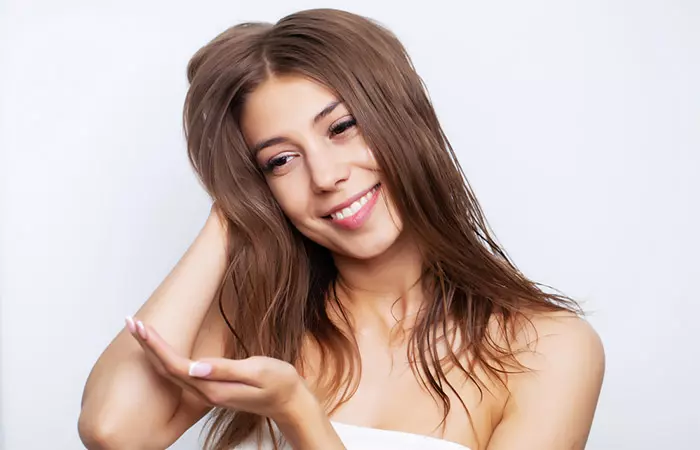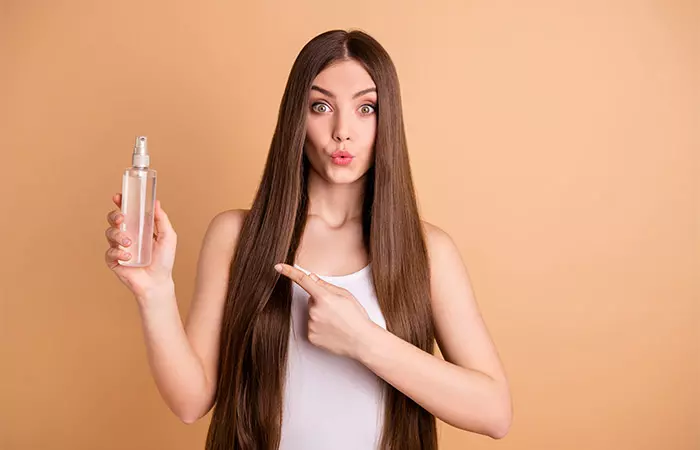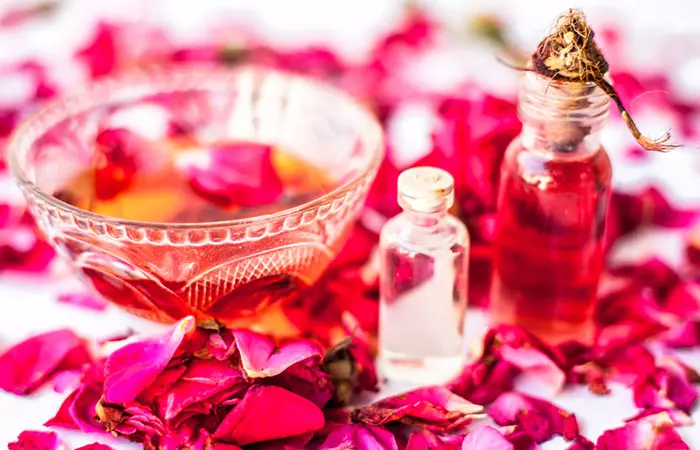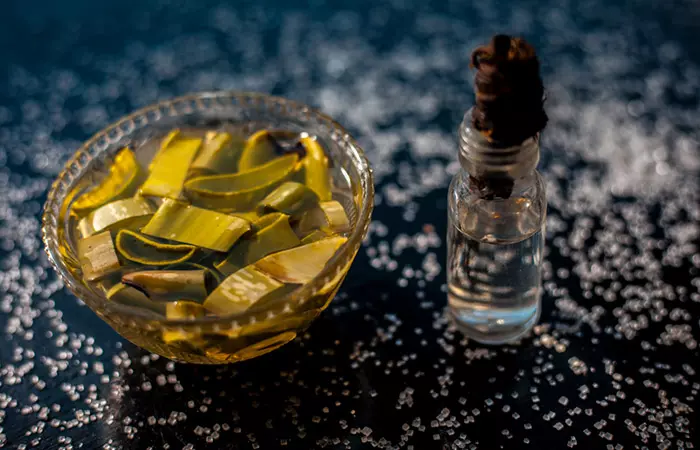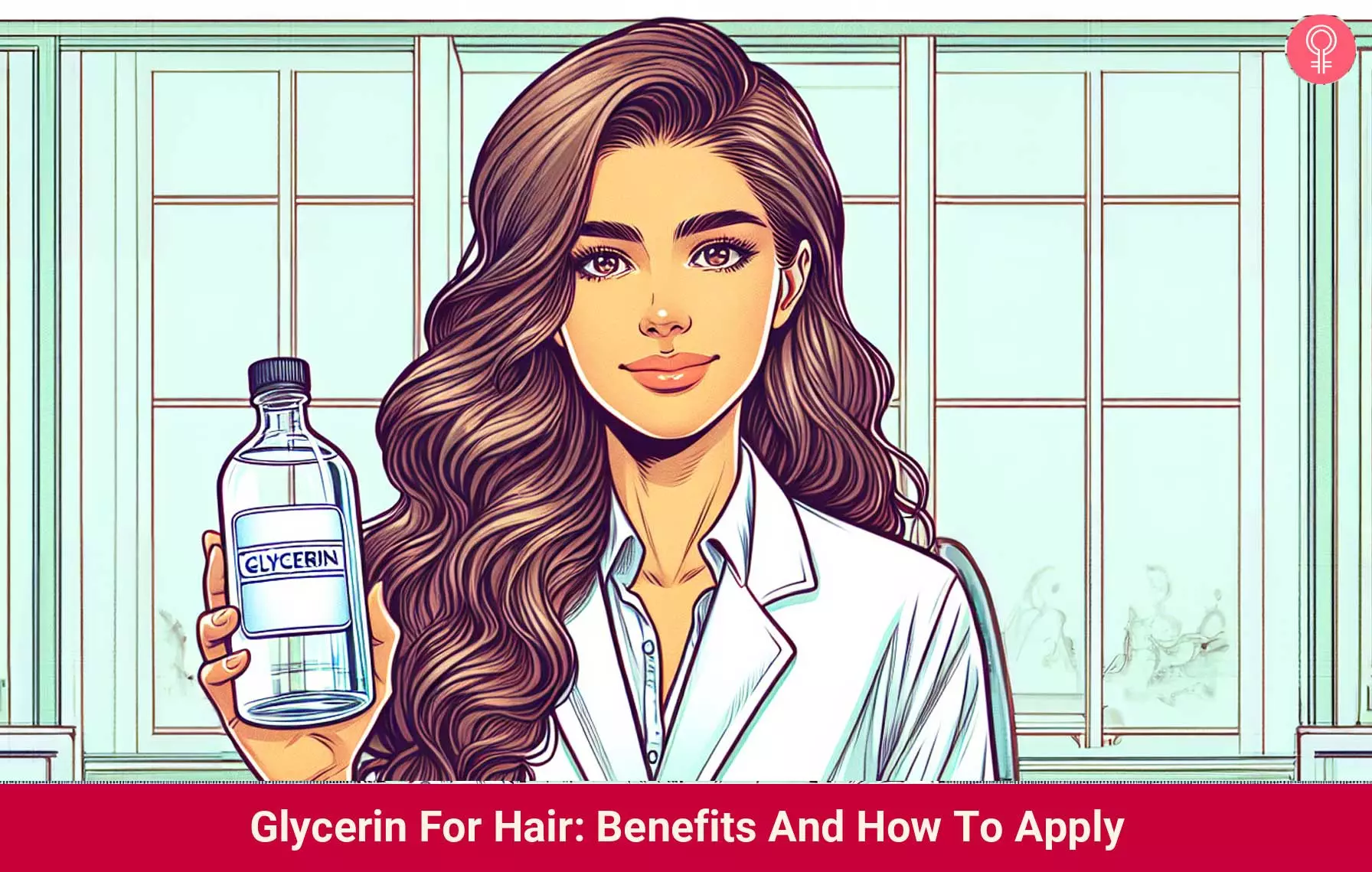The History Of Glycerin
Glycerin can be traced back to the ancient times when it was discovered as a natural byproduct of soap-making. While the French chemist Michel-Eugène Chevreul coined the term glycerin (or glycerine) in 1811, the substance was discovered by German-Swedish chemist Carl Wilhelm Scheele in 1783, who described it as the “sweet principle of fat”. What Are Its Benefits? It hydrates your hair, eliminates breakage, and improves scalp health. Who Can Use It? Especially effective for dry, dehydrated, coarse, or thick hair. How Often? Three times a week. Caution Avoid using it if you are allergic to it or have just got a dye job.
Glycerin slowly gained prominence as a vital ingredient in the pharmaceuticals, cosmetics, and food industries. Its use expanded during the 19th century when it became a key component in the dynamite-making process. Over time, its significance in personal care products surged due to its moisturizing and emollient qualities. The benefits of using glycerin on lips and skin, such as its ability to hydrate and protect against dryness, became a key reason for its widespread adoption in lip and skin care products. Glycerin has therapeutic properties that help improve skin health. But can it improve your hair health as well? Find out in the next section.
Glycerin For Hair: Is It Good?
Glycerin is known to suit all hair types, including curly, frizzy, and thick hair. Anecdotal evidence suggests it may repair damaged hair. Glycerin may also hydrate and replenish dry hair. It can fortify split ends, prevent hair breakage, and combat dandruff. A blogger who writes on natural hair recommends using glycerine for dull and dry hair: “I find that glycerine does wonders for one’s hair, especially if one has dry hair like mine. And it is really affordable (i).” She adds, “The chemical make up allows glycerine to draw moisture from the air to my hair which is exactly what my hair needs. I love that glycerine helps moisturize hair but I don’t like that it is not so great for hairstyles that require my hair to be out and bouncing….” In the following section, we will look at the benefits of glycerin backed by some research.
Benefits Of Glycerin For Hair
Many people know how to use glycerin on the face but what about hair? Read the next section to learn more.
How To Use Glycerin For Hair
1. Hairspray
You Will Need
Rosewater: ½ cup Peppermint or rosemary essential oil: 4 to 5 drops Glycerin: 2 tablespoons Water: ½ cup A spray bottle
Preparation Time 2 minutes Processing Time N/A Procedure How Often Once every week Why It works Research shows that rosewater can help retain skin moisture (8). This may treat dry and itchy scalp disorders. Peppermint and rosemary have antimicrobial and antifungal properties that may help keep the scalp clean (9).
2. Castor Oil With Glycerin
You Will Need
Castor oil: 1 tablespoon Glycerin: 1 tablespoon Water: 2 tablespoons Apple cider vinegar: 1 tablespoon Egg yolk: 1
Preparation Time 2 minutes Processing Time 20-45 minutes Procedure How Often Once every week Why It Works Castor oil may help stimulate hair growth. Apple cider vinegar is known to help preserve the pH level of the scalp. It also acts as a cleansing agent. Egg yolk contains peptides that can stimulate hair growth (10).
3. Olive Oil, Glycerin, And Honey
You Will Need
Olive oil: 1 tablespoon Glycerin: 1 tablespoon Honey: 1 tablespoon
Preparation Time 2 minutes Processing Time 30 minutes Procedure How Often Once every week Why It Works Research shows that olive oil can penetrate the hair follicles and protect the hair from within (11). It contains oleic acid that can inhibit 5-alpha reductasei An enzyme present in the prostate, liver, and skin which helps convert testosterone into DHT. Its deficiency affects male sexual development. and help prevent hair loss (12). This enzyme converts testosterone to dihydrotestosteronei A pure androgen and a derivative of testosterone (male sex hormone) which can affect hair follicles. (DHT), which causes alopecia (13). Honey helps treat chronic dandruff and moisturizes the scalp and hair (14).
4. Rose Water And Glycerin
You Will Need
Rosewater: 2 tablespoons Glycerin: 1 tablespoon Water: 2 tablespoons
Preparation Time 2 minutes Processing Time N/A Procedure How Often Once every week Why It Works Rosewater and glycerin are beneficial for the hair. Anecdotal evidence suggests that this mask helps maintain hair health.
5. Aloe Vera And Glycerin
You Will Need
Aloe vera gel: 1 tablespoon Glycerin: 1 tablespoon
Preparation Time 2 minutes Processing Time 1 hour Procedure How Often Once every week Why It Works The benefits of aloe vera are well known. It helps stimulate hair growth, hydrates dry hair, and repairs dry, damaged hair (15), (16). This combination is ideal for dry, damaged, and chemically treated hair.
6. Honey And Glycerin
You Will Need
Honey: 3 tablespoons Glycerin: 2 tablespoons Water: 2 tablespoons
Preparation Time 2 minutes Processing Time 30 minutes Procedure How Often Once every week Why It Works Honey is a well-known emollienti An agent or substance that hydrates the skin by forming a protective barrier and trapping moisture in the skin. and keeps the scalp clean from infections like dandruff. Research shows that honey is often used to treat hair and scalp disorders (17). Pairing it with glycerin can boost hair hydration, making your hair healthier and bouncier.
7. Lemon Juice, Eggs, And Glycerin
You Will Need
Lemon juice: 2 tablespoons Glycerin: 1 tablespoon Eggs: 2
Preparation Time 2 minutes Processing Time 45 minutes Procedure How Often Once every week Why It Works Lemon has a high concentration of vitamin C. Vitamin C deficiency is known to cause scurvy and may lead to hair loss (18). It may also help treat hair loss, dandruff, lice, and scalp acne (19). Lemon and glycerin also clarify the scalp and hair.
8. Hair Products
You can also add glycerin to your conditioners and shampoos to boost their moisturizing properties. Glycerin retains moisture and softens the hair.
Pros And Cons Of Using Glycerin For Hair
Types Of Glycerin
Vegetable glycerin is a thick, colorless, and odorless liquid obtained from coconut and soybean. It is popular in the cosmetic industry for its skin moisturizing benefits. Animal-derived glycerin is extracted from animal fats. It is commonly used in beauty and personal care products.
Did you know glycerin is also called glycerol, glycerine vegetale, and glyceryl alcohol when used in cosmetic products? Since it is often used in hair and skin products, it is important to know if it may cause any side effects.
Side Effects
The topical application of glycerin is considered safe (20). But it should not be used on cracked or broken skin. When used on the hair, glycerin should be paired with oils, water, or other serums to ensure it does not weigh the hair down or make it greasy. Glycerin carries heat very well. Hence, it must not be applied to the hair when using heating tools like curling irons or blow dryers. It may also cause hair damage and make the hair and scalp feel very sticky. Glycerin may also cause allergic reactions in some. Perform a patch test on your wrist, forearm, or just below the back hairline before using. Check for any redness, swelling, burning, bumps, or itching. Most of these adverse effects are based on anecdotal evidence. It also must be noted that glycerin cannot be used at all times. We will discuss this further in the coming section.
When You Should Not Use Glycerin
It is advisable not to use pure glycerin during winters. In winters, our skin tends to crack. Hence, do not use pure glycerin on the skin without any carrier oil or water. Glycerin tends to thicken when cold and may thicken when applied to the hair and dry it up. Can I mix glycerin with coconut oil? Yes. You can mix glycerin and coconut oil in a 1:1 ratio in a cup of water to make a nourishing hair spray. Is glycerin bad for curly hair? It depends on the weather. Glycerin is a humectant and pulls moisture from the air to hydrate your hair. If the weather is too humid or too dry, it might end up making your curly hair lose its definition or become too frizzy. Is glycerin good for relaxed hair? Yes. Glycerin helps hydrate your relaxed hair and protect it against frizz and breakage. Can I use glycerin overnight? Yes. Glycerin is considered safe for overnight use on your hair as it helps keep it moisturized.
Illustration: Glycerin For Hair: Benefits And How To Apply
